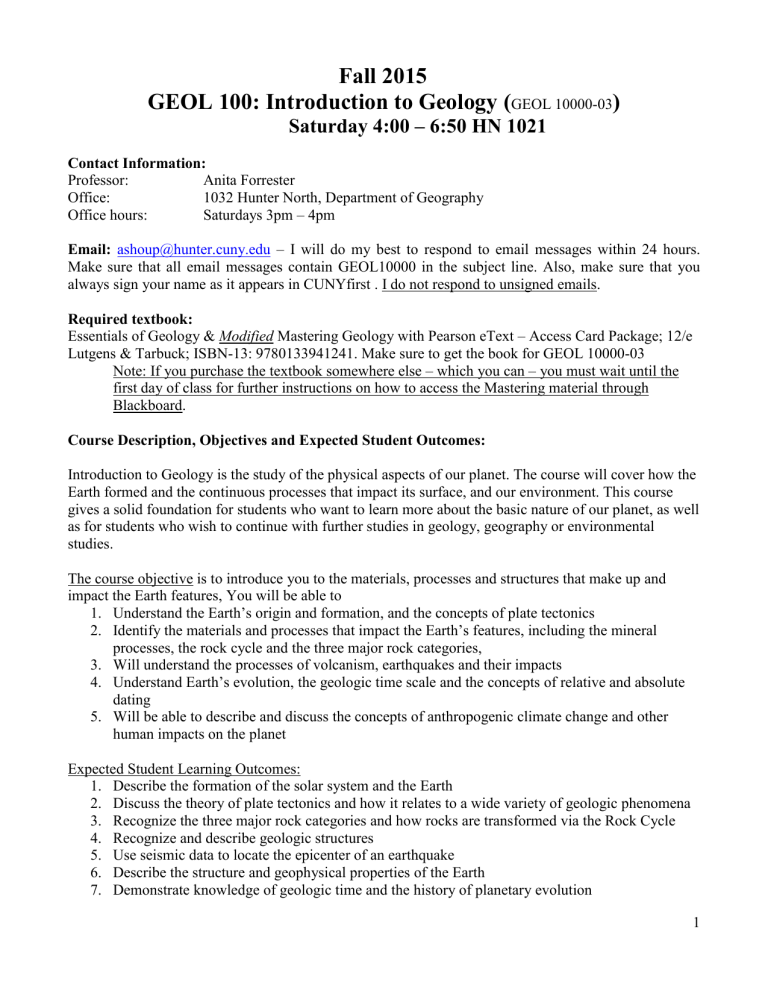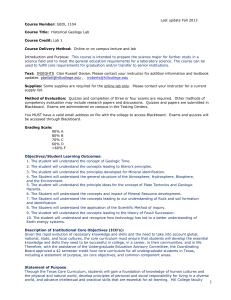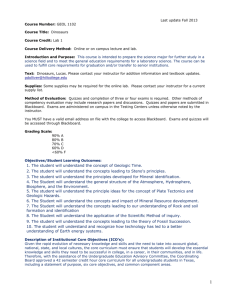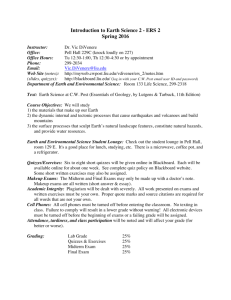Fall 2015 GEOL 100: Introduction to Geology (GEOL 10000-03)

Fall 2015
GEOL 100: Introduction to Geology (
GEOL 10000-03
)
Saturday 4:00 – 6:50 HN 1021
Contact Information:
Professor: Anita Forrester
Office:
Office hours:
1032 Hunter North, Department of Geography
Saturdays 3pm – 4pm
Email: ashoup@hunter.cuny.edu
– I will do my best to respond to email messages within 24 hours.
Make sure that all email messages contain GEOL10000 in the subject line. Also, make sure that you always sign your name as it appears in CUNYfirst . I do not respond to unsigned emails.
Required textbook:
Essentials of Geology & Modified Mastering Geology with Pearson eText – Access Card Package; 12/e
Lutgens & Tarbuck; ISBN-13: 9780133941241. Make sure to get the book for GEOL 10000-03
Note: If you purchase the textbook somewhere else – which you can – you must wait until the first day of class for further instructions on how to access the Mastering material through
Blackboard.
Course Description, Objectives and Expected Student Outcomes:
Introduction to Geology is the study of the physical aspects of our planet. The course will cover how the
Earth formed and the continuous processes that impact its surface, and our environment. This course gives a solid foundation for students who want to learn more about the basic nature of our planet, as well as for students who wish to continue with further studies in geology, geography or environmental studies.
The course objective is to introduce you to the materials, processes and structures that make up and impact the Earth features, You will be able to
1.
Understand the Earth’s origin and formation, and the concepts of plate tectonics
2.
Identify the materials and processes that impact the Earth’s features, including the mineral processes, the rock cycle and the three major rock categories,
3.
Will understand the processes of volcanism, earthquakes and their impacts
4.
Understand Earth’s evolution, the geologic time scale and the concepts of relative and absolute dating
5.
Will be able to describe and discuss the concepts of anthropogenic climate change and other human impacts on the planet
Expected Student Learning Outcomes:
1.
Describe the formation of the solar system and the Earth
2.
Discuss the theory of plate tectonics and how it relates to a wide variety of geologic phenomena
3.
Recognize the three major rock categories and how rocks are transformed via the Rock Cycle
4.
Recognize and describe geologic structures
5.
Use seismic data to locate the epicenter of an earthquake
6.
Describe the structure and geophysical properties of the Earth
7.
Demonstrate knowledge of geologic time and the history of planetary evolution
1
8.
Describe how geologic resources are formed and distributed
9.
Discuss the impact of human activity on the Earth’s climate
Preliminary Class Schedule:
Part 1: Intro, Chapter 1- 8 Exam 1 (3/19)
Part 2: Chapters 9-20 Exam 2 (5/28)
A more detailed schedule will be posted on the Blackboard site and is included below. Please check it often as the schedule can and will change depending on discussion times. Updates will be posted reflecting these changes.
Grading policy:
Exams
BlackBoard Mastering Assignments
60%
30%
Lecture review quizzes and class assignments 10%
Exams: Exams will be a mix of multiple choice, true/false and fill-in-the-blank questions.
Weekly BlackBoard Mastering Assignments: There will be assignment to be completed before the beginning of the next class each week, and these labs are always due by the beginning of lab.
Lecture review quizzes: At the beginning of each lecture there will be a 5-10 minute review quiz covering the last lecture’s material to help you keep on track and on schedule with the course.
In-class assignments: There will be occasional in-class work, video review, field trip report, etc.
There will be NO INCOMPLETES (with the exception of a death, serious illness, or work-related issues such as travel. A notification is required for all exceptions). Incompletes will be given only if student’s grade is at “C” or above at the time the IN is requested, and with evidence of a satisfactory reason. Otherwise you will receive a grade of WU. To receive a CR/NC you must have completed all of the course requirements (exams, quizzes, etc.) and have requested the CR/NC option prior to beginning the final exam.
Based on your final score you will be assigned as a letter grade based on the numerical standards that can be found in the Hunter College Undergraduate Catalogue at http://catalog.hunter.cuny.edu/
Course Policies
Attendance is an integral part of the course. Missing lecture will negatively impact your performance and there will be things discussed in class that are not in your textbook. Since we meet only once a week, missing a single Saturday session is the equivalent of missing two lectures, or an entire week of regular classes. After the first full day absence, any additional full day or equivalent absence will result in a 5 point deduction from your final grade. Lecture 1 is scheduled from 4:00 – 5:15 PM;
Lecture 2 is from 5:30 – 6:45 PM. Attendance will be recorded during each of the lecture sessions.
Any work assigned must be completed before the next class session begins whether you are in class or not. Missing a lecture class does not excuse you from completing and submitting the material that was assigned or that was due on that day. If you know you will miss a class, you may scan and send me any assignment that may be due as long as I receive it before class begins.
2
If you missed an exam for a satisfactory and documented reason you must contact me within two days of the missed exam deadline to schedule a make-up at a mutually convenient time. After that the grade will automatically be recorded as a zero.
Classroom Electronics Policy:
The use of electronic dictionaries will be permitted during lectures only. All other personal electronics, such as phones, laptops, tablets, etc., must be silenced AND put away or turned off before coming into the classroom. You will be reminded of the policy once, after that you will be asked to leave the classroom. There is no need to use a laptop/tablet/iPad during lecture, however you may use it in lab after the instruction portion of the lab is over. If it becomes a distraction to you and/or the people around you, I will ask you to shut it off.
Blackboard:
Make sure that your Blackboard account is active and that you know how to use it. I will regularly use BB to remind you of course related work, send out assignments, reminders and emails. There may be classwork and assignments that are Blackboard-based (i.e., exams, quizzes, discussion, etc.).
I will not be responsible for work that you miss because you did not check your @myhunter email account or you didn’t check BlackBoard.
Hunter College Policy on Academic Integrity
Hunter College regards acts of academic dishonesty (e.g., plagiarism, cheating on examinations, obtaining unfair advantage, and falsification of records and official documents) as serious offenses against the values of intellectual honesty. The College is committed to enforcing the CUNY Policy on Academic Integrity and will pursue cases of academic dishonesty according to the Hunter College
Academic Integrity Procedures.
ADA Policy:
In compliance with the American Disability Act of 1990 (ADA) and with Section 504 of the
Rehabilitation Act of 1973, Hunter College is committed to ensuring educational parity and accommodations for all students with documented disabilities and/or medical conditions. It is recommended that all students with documented disabilities (Emotional, Medical, Physical, and/or
Learning) consult the Office of AccessABILITY, located in Room E1214B, to secure necessary academic accommodations. For further information and assistance, please call: (212) 772-4857 or
(212) 650-3230.
Syllabus Policy:
Except for changes that substantially affect grading, this syllabus is a guide for the course and is subject to change with advance notice. These changes will be announced in class and through
Blackboard announcements. Make sure to check Blackboard regularly.
3
PRELIMINARY COURSE SCHEDULE – SEE BB FOR UPDATES
Lecture Schedule
1 30-Jan Introduction to the course; Chapter 1: Introduction to Geology
2 6-Feb Chapter 2: Plate Tectonics: A Scientific Revolution Unfolds
3 13-Feb Chapter 4: Igneous Rocks and Intrusive Activity;
4 20-Feb Chapter 5: Volcanoes and Volcanic Hazards
5 27-Feb Chapter 6: Weathering and Soils;
6 5-Mar Chapter 7: Sedimentary Rocks;
7 12-Mar Chapter 8: Metamorphism and Metamorphic Rocks;
8 19-Mar Exam 1 (Chapters 1-8); Documentary (TBA) x 26-Mar No classes scheduled
9 2-Apr Chapter 9: Earthquakes and Earth's Interior; Chapter 10: Origin and Evolution of the Ocean Floor
10 9-Apr Chapter 12: Mass Wasting; Chapter 16: Deserts and Wind;
11 16-Apr Chapter 13: Running Water; Chapter 14: Groundwater; Chapter 15: Glaciers x 23-Apr No classes scheduled x 30-Apr No classes scheduled
12 7-May Central Park Field Trip
13 14-May Chapter 18: Geologic Time Chapter 19: Earth's Evolution through Geologic Time
14 21-May Chapter 20: Global Climate Change
15 28-May Final Exam (Chapters 9-20)
4



